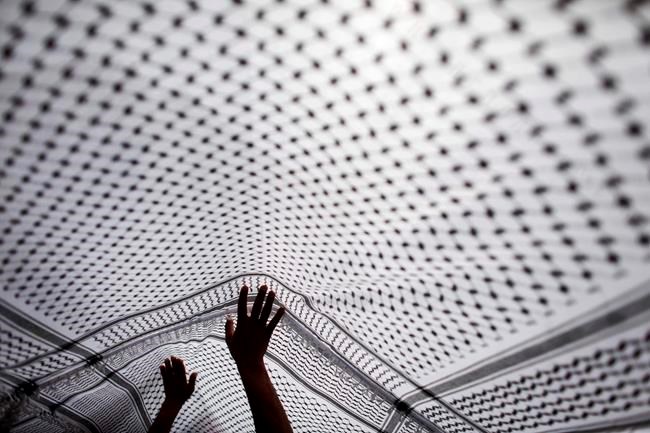TORONTO — The Speaker of Ontario's legislature is standing by a ruling that bans people in the building from wearing keffiyehs, which he says are being worn to make a political statement, even after the premier and all opposition parties asked him to reverse it.
The legislature has a long-standing rule that members can't use props, signage or accessories intended to express a political statement, and Speaker Ted Arnott said after "extensive research" he has concluded that keffiyehs meet that definition.
"It's extremely politically sensitive, obviously, but procedurally I believe I made the right decision in the sense of past rulings of speakers and precedents and traditions," Arnott said Thursday after question period.
"In my opinion, having done the research, it appeared to me that the keffiyeh is being worn to make a political statement."
A keffiyeh is a checkered scarf typically worn in Arab cultures that has come to symbolize solidarity with Palestinians.
Members of provincial parliament often ask special permission to wear an item that may break the rules, such as ribbons for a particular cause's awareness day, and they do that by seeking unanimous consent of the legislature.
NDP Leader Marit Stiles moved a unanimous consent motion Thursday morning saying the keffiyeh is a culturally significant clothing item in Palestinian, Muslim and Arab communities and should be allowed in the house, but Arnott said he heard a few people say "no."
The loudest "no" came from Progressive Conservative backbencher Robin Martin.
"I think (Arnott's ruling) is the correct decision, in the same way we can't use other kinds of political clothing," Martin said after question period.
"We can't wear T-shirts that say, 'Free the hostages' or wrap ourselves in a flag or whatever. We have to follow the rules of the legislature. Otherwise, we politicize the entire debate inside the legislature and that's not what it's about ... we use our words to persuade, not our items of clothes."
Martin's position is in contrast to her leader's, with Premier Doug Ford calling on the Speaker to reverse his decision.
"It really comes down to uniting Ontarians and communities," the premier said Thursday morning at an unrelated press conference. "We see the division right now that's going on. It's not healthy, and this will just divide the community even more."
The National Council of Canadian Muslims also called on the Speaker to remove the ban.
"Banning the keffiyeh from the Ontario legislature is another sign that Palestinian identity is being attacked today, including in our halls of power," the group wrote in a statement.
Stiles said she was disappointed her motion didn't pass and pressed the government to act.
"I think the premier needs to now make sure that his caucus does the right thing," she said.
The issue came to Stiles' attention last week when one of her staffers, who wears a keffiyeh every day, had to remove it before entering the building.
The Legislative Protective Service told the staffer to remove the keffiyeh, she said.
Arnott said that the issue came up a few weeks ago, when one member of provincial parliament – he would not say who – brought to his attention that Sarah Jama, who sits as an independent, was wearing a keffiyeh.
Jama was elected in a byelection last year as a New Democrat, but Stiles kicked her out of the caucus in the fall after a series of events that began with a statement by Jama on the Israel-Hamas war that failed to mention or condemn the attack on Israeli civilians. The ouster ultimately came after a series of moves from Jama that either publicly defied Stiles or caught her unaware.
Jama said the legislature's ban is an example of Palestinian identity being demonized and suppressed in Ontario.
Liberal parliamentary leader John Fraser said Ford needs to show some leadership to fix the issue.
"The premier needs to say to his house leader, 'I'm putting forward a motion,' and when they put forward the motion, we'll all be there to support it," Fraser said.
"We can't continue to debate this, we have other more important things to talk about."
This report by The Canadian Press was first published April 18, 2024.
Allison Jones and Liam Casey, The Canadian Press




